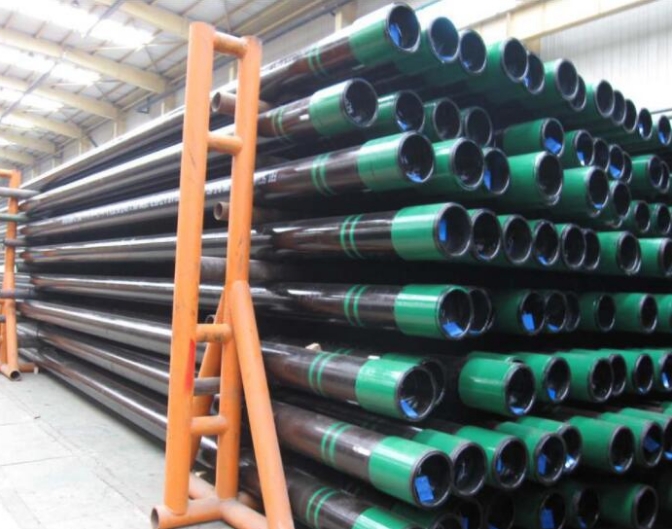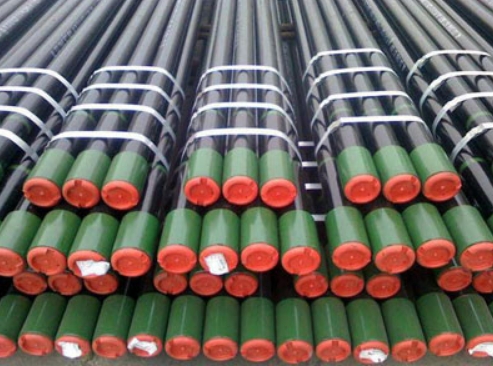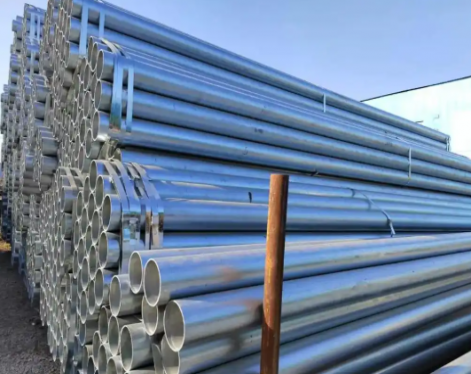1.What is steel casing pipe?
Oil casing is a non-circulating steel pipe component used to stabilize the wellbore structure of oil and gas wells. Its core role is to ensure the stability of the wellbore during drilling operations and the long-term effective operation of the entire wellbore after completion.According to different drilling depths and complex geological conditions, each well will be installed with several layers of casing with different functions according to actual needs. After being lowered into the well and installed, the casing is permanently fixed using cement cementing technology, unlike reusable tubing and drill pipe.In view of the irreplaceability and one-time consumption characteristics of casings in oil well construction, they account for a significant proportion of the entire oil well pipe material consumption, usually exceeding 70%.
According to the specific use and location of casing in the wellbore, it can be subdivided into multiple categories, including conduit, surface casing, technical casing and oil layer casing. These different types of casing each bear specific functions. The important task of supporting, isolating and protecting the well walls.

2. Factors affecting the performance of oil casing
(1)Material
The primary factor affecting the strength of oil casing is material selection. Commonly used materials for oil casing include carbon steel and alloy steel. Carbon steel has excellent weldability and workability, while alloy steel has high strength and wear resistance.During the drilling process, the constant friction and impact between the drill bit and the casing will cause damage to the casing material, so it is very important to choose the appropriate material.(2)Design Specifications
The outer diameter, wall thickness, and manufacturing accuracy also affect its strength and performance. Proper design ensures the casing pipe can withstand pressure and loads.(3)Quality control
The production of oil casing pipes needs to follow a series of strict standards and regulations to ensure their quality and safety in use. To ensure the quality of steel pipe products, steel pipe manufacturing requires direct quality inspection.(4)Installation practice
Installation practices are also one of the key factors affecting bushing performance. If improper operations or defects occur during construction, the mechanical properties of the steel pipe may be damaged.
3.How to improve casing performance?
(1) Choose high-quality raw materials
Material selection and quality control play pivotal roles in ensuring the reliability and performance of casing pipes. The choice of material, such as ERW casing pipe, directly impacts the durability and integrity of the pipes in underground construction and utility projects.Rigorous quality control measures during manufacturing, including material testing and adherence to industry standards like ASTM, are essential to guarantee the strength and resilience of the casing pipes.Inspection protocols and compliance audits further validate the quality and reliability of the materials used in casing pipe construction, ensuring they meet the required specifications for various applications.(2) Strictly control production quality
a.Produced according to standardsDuring the production process, operations are strictly carried out in accordance with the prescribed process standards, and the equipment must be regularly maintained and inspected to ensure that the pipes produced are of high quality and stable in size.
b. Strengthen measurement
Measurement and inspection are one of the key links to improve assembly accuracy. Through precise measurement and inspection, information such as the size, shape, and surface quality of the casing can be grasped, allowing precise control of the assembly process. Various measurement methods and equipment can be used, such as optical measurement, detectors, three-coordinate measurement, etc., to ensure the accuracy and stability of the measurement results.
c. Control assembly
The assembly process is one of the important links where errors occur, so control needs to be strengthened. First of all, the stability and accuracy of the assembly equipment must be ensured. The equipment must be maintained and calibrated regularly to ensure its normal operation.
(3) Strengthen anti-corrosion
The anti-corrosion of oil casing is mainly divided into: a.Apply anti-corrosion coating on the outer wall. b. Apply anti-corrosion coating on the inner wall. c. Apply anti-corrosion and cooling coating. The material and structure of oil casing must have excellent physical properties, stable chemical properties, and a wide temperature range.If the oil casing cannot be used, it should be coated with anti-corrosion coating to enable it to cope with the harsh environment. Applying a coating to the outer wall is used to reduce external erosion.The anti-corrosion coating on the inner wall is to reduce friction, reduce corrosion in the pipe, and increase oil transportation. The anti-corrosion insulation coating is used to transport crude oil and fuel oil and reduce the heat dissipation from the pipeline to the soil.
(4)Quality testing
a. Physical and chemical testing: Physical and chemical testing is the main method for testing the material of casing steel pipes, including chemical composition analysis, mechanical property testing, etc.Chemical composition analysis can be used to detect whether the steel pipe meets the specified chemical composition; mechanical property tests mainly include tensile test, hardness test, impact test, etc., which are used to detect the tensile strength, hardness and other indicators of the steel pipe.b. Appearance quality inspection: The surface quality of the casing pipe is an important factor affecting its service life. Appearance quality inspection mainly includes inspection of surface defects, surface finish, surface coating, etc.
c. Dimensional inspection: The length, inner diameter, outer diameter and other dimensional parameters of the steel pipe should be within the specified range. Dimensional inspection can be carried out through internal and external calipers, tape measures and other tools of the steel pipe.
d. Non-destructive testing: Non-destructive testing refers to the method of detecting defects in steel pipe materials or components. The detection principle is to detect materials and components by adding external energy to them. Commonly used non-destructive testing methods include ultrasonic testing, X-ray testing, penetrant testing, etc.
(5) Install with caution
When carrying out reinforced casing construction, you need to pay attention to the following matters:a. Ensure the strength and stability of the casing
According to the geological characteristics and engineering requirements of the wellbore, appropriate casing materials and specifications are selected to ensure that the casing has sufficient strength and stability.
b. Control casing position
When carrying out casing construction, attention needs to be paid to controlling the position of the casing to ensure a uniform gap between it and the well wall and to avoid damaging the integrity of the wellbore.
c. Pay attention to the casing connection
The casing connection should be tight and reliable, and appropriate connection accessories should be used to prevent problems such as leakage and breakage.
Consider the wellbore environment: When performing casing construction, it is necessary to consider the impact of the wellbore environment on the casing, such as temperature, pressure, corrosion and other factors, and take corresponding protective measures.
d. Timely record and report
Record key steps and data during the construction process, and report relevant issues and progress in a timely manner.
Previous:LSAW steel pipe pile









